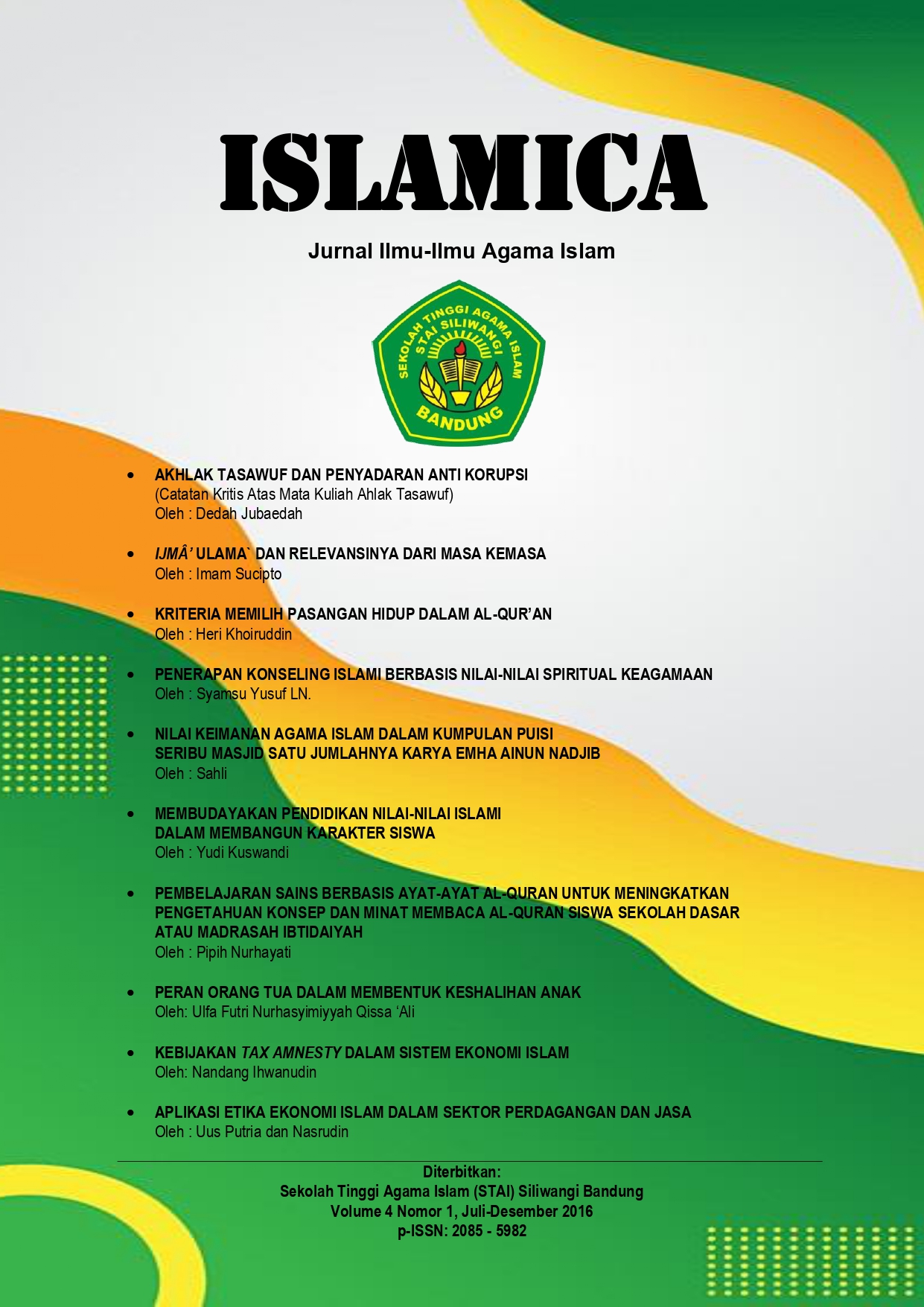Membudayakan Pendidikan Nilai-Nilai Islami Dalam Membangun Karakter Siswa
DOI:
https://doi.org/10.59908/islamica.v4i1.67Kata Kunci:
culture, education, islamic values, character of the nationAbstrak
The important role shown by formal educational institutions is very effective in cultivating Islamic values for the formation of characters expected by the Indonesian nation. The activities of professional practitioners combine consistent constellation of values, goals, sanctions, knowledge and methods manifested in the form of certain moral ideas. Concrete operational form expressed in daily deeds with the level of system and target that has been determined, into its own value in growing the character istiqamah. Values are a key element in the social structure that influences the basic orientation, belief system, as well as the actions of individuals and social institutions. Values influence the guidelines or criteria for the appearance of a person's character behavior. Although in other studies the family character education may be more effective, but in this study the character culture values in formal education institutions are more effective because psychologically the learners will be more obedient, afraid, and reluctant to the teacher than the parents or the general public. The main key is consistent in the application of rules, evaluation, reward and punishment in applying religious, moderate, intelligent, independent, and national character which serve as the benchmark for successful implementation of Islamic values to shape the nation's character. The methods adopted in this study site may be grounded theory designs in the formation of Islamic values in order to have a generation of characters that are rolled out by the government, amidst the moral, mental and character crises of learners and teenagers in general.
Finally, if in this study many shortcomings or errors can be retested by the same methods and tools and generate new conclusions that may be the same or may be different. Suggestions and suggestions from various parties that are competent are expected to improve the writing and research.
Referensi
Agustian, Ary Ginanjar. Membangun Sumber Daya Manusia dengan Kesinergisan antara Kecerdasan Spiritual, Emosional, dan Intelektual. Pidato Ilmiah Penganugerahan Gelar Kehormatan Doctor Honoris Causa di Bidang Pendidikan Karakter, UNY 2007.
______________,Rahasia Sukses Membangun Kecerdasan Emosional dan Spiritual ESQ. Jakarta: Arga. 2003
Azra, Azyumardi. Agama, Budaya, dan Pendidikan Karakter Bangsa. 2006
Djalil, Sofyan A. dan Megawangi, Ratna. Peningkatan Mutu Pendidikan di Aceh melalui Implementasi Model Pendidikan Holistik Berbasis Karakter. Makalah Orasi Ilmiah pada Rapat Senat Terbuka dalam Rangka Dies Natalis ke 45 Universitas Syiah Kuala Banda Aceh, 2 September 2006.
Elkind, David H. dan Sweet, Freddy. How to Do Character Education. Artikel yang diterbitkan pada bulan September/Oktober 2004.
Jalal, Fasli dan Supriadi, Dedi. Reformasi Pendidikan dalam Konteks Otonomi Daerah. Yogyakarta: Adicita Karya Nusa, 2001.
Kamus Besar Bahasa Indonesia, Jakarta: Gramedia Pustaka Utama. 2008
Kementerian Pendidikan Nasional, 2010
Lickona, Thomas, Educating for Character: How Our Schools Can Teach Respect and Responsibility. New York: Bantam Books, 1992.
Lickona, Tom; Schaps, Eric, dan Lewis, Catherine. Eleven Principles of Effective Character Education. Character Education Partnership, 2007.
Moleong, J. Lexy. 2004. Metodologi Penelitian Kualitatif. Bandung: Rosdakarya.
Pimpinan Pusat Muhammadiyah. Revitalisasi Visi dan Karakter Bangsa. Yogyakarta: PP Muhammadiyah, 2009.
Sairin, Weinata. Pendidikan yang Mendidik. Jakarta: Yudhistira, 2001
Samani, Muchlas & Haryanto. Pendidikan Karakter. Bandung: Remaja Rosadakarya. 2012.
Sugiyono. 2010. Metode Penelitian Pendidikan Pendekatan Kuantitatif, Kualitatif, dan R & D. Bandung: Alfabeta.
Suyanto dan Hisyam, Djihad. Pendidikan di Indonesia Memasuki Milenium III: Refleksi dan Reformasi. Yogyakarta: Adicita Karya Nusa, 2000.
Suyatno; Sumedi, Pudjo, dan Riadi, Sugeng (Editor). Pengembangan Profesionalisme Guru: 70 Tahun Abdul Malik Fadjar. Jakarta: UHAMKA Press, 2009.
Sutrisno, Mudji dan Putranto, Hendar. Teori-Teori Kebudayaan. Jakarta: Kanisius. 2016.
Tafsir, A. 2010. Metodologi Pengajaran Agama Islam, Bandung: Remaja Rosda Karya.
U. S. Department of Education. Office of Safe and Drug-Free Schools. 400 Maryland Avenue, S.W. Washington, DC.
Pearce, Robinson. Strategic Management. Jakarta: Penerbit Salemba. 2003.
Proceeding Seminar Nasional. Penelitian, Pendidikan, dan Penerapan MIPA, Fakultas MIPA Yogyakarta, 2012
Tilaar, H.A.R. 1999. Pendidikan, Kebudayaan, dan Masyarakat Madani Indonesia: Strategi Reformasi Pendidikan Nasional. Bandung: Remaja Rosdakarya.
UU Nomor 20 Tahun 2003 Tentang Sistem Pendidikan Nasional.
West, Richard dan Turner, Lynn H. Pengantar Teori Komunikasi: Analisis dan Aplikasi. Jakarta: PT. Salemba Humanika. 2008.
Unduhan
Diterbitkan
Cara Mengutip
Terbitan
Bagian
Lisensi
Hak Cipta (c) 2016 Yudi Kuswandi

Artikel ini berlisensiCreative Commons Attribution-ShareAlike 4.0 International License.

















